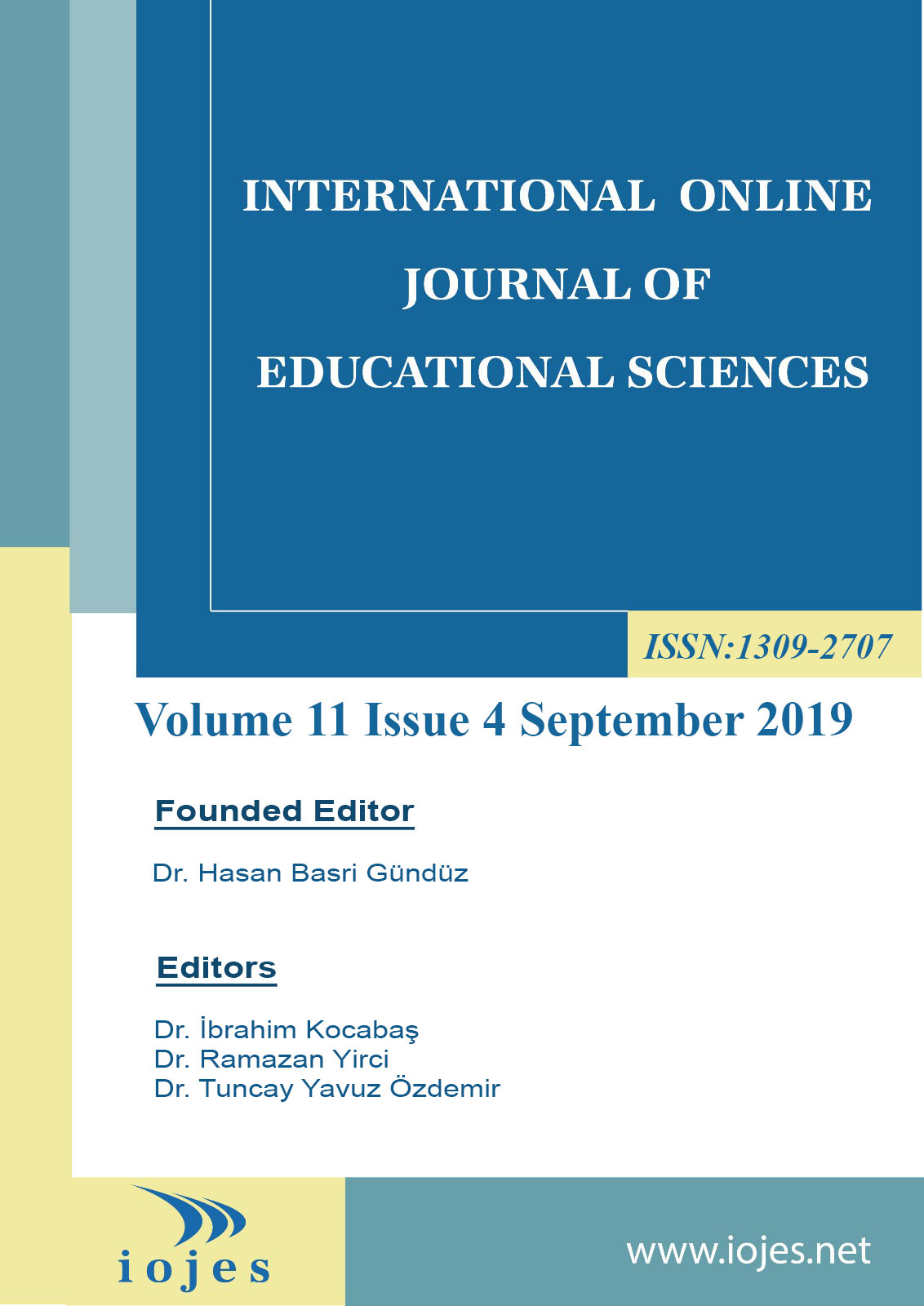Author :
Abstract
Keywords
Abstract
The increased rate of technology usage that started globally with Generation Y has climbed to even higher levels with Generation Z. Widespread Internet usage has come with some risks that are now threatening children such as bullying, racism, deception and sexual abuse. The main purpose of this research is to consider mothers’ opinions of their children’s habits in using technological tools and the problems observed in children due to the use of technology and addresses in detail how mothers manage their children’s technology use and the problems associated with this usage. This research was carried out with 20 mothers whose children are primary school students. The content analysis method was used for the analysis of the data obtained during the research. The data obtained during the research was evaluated by two different specialists to determine the relevant themes. The inter-observer reliability coefficients regarding these two evaluations were calculated. It can be said that the surveyed mothers generally perceive themselves as adequate mothers. Research findings show that mothers generally see themselves as a parent enough. Most of the mothers stated that the use of technology caused some problems in their children. However, it can be said that mothers are insufficient to cope with these problems and that they exhibit inconsistent behaviors in coping with problem behaviors.
Keywords
- APA (American Counselling Association). (2018). Digital guidelines: Promoting healthy technology use for children. Retrieved November 24, 2018, from https://www.apa.org/helpcenter/digital-guidelines.aspx#
- Blaffer Hrdy, S. (1999). Mother nature a history of mothers, infants, and natural selection. Retrieved December 28, 2018, from https://static1.squarespace.com/static/56a7cac4e0327c116bd2394a /t/599f1ef9893fc 05aebc f8ebb/ 1503600378151/Mother+Nature+NYT+Excerpts.pdf.
- Borg, L. (2017). Nearly 90 per cent of mothers feel guilty. The good news? You can conquer it. Retrieved January 4, 2018, from https://www.telegraph.co.uk/family/parenting/nearly-90-per-cent-mothers-feel-guiltygood-news-can-conquer/
- BPI Network (2018). Parental burnout crisis in corporate America. Retrieved December 29, 2018, from http://www.bpinetwork.org/thought-leadership/studies/67
- D., Eraslan (2016). Yeni annelik: Yetersiz hissedenler kulübü. Retrieved November 21, 2018, from, http://www.radikal.com.tr/yazarlar/defne-eraslan/yeni-annelik-yetersiz-hissedenler-kulubu-1514790/
- Karahisar, T. (2013). Dijital nesil, dijital iletişim ve dijitalleşen (!) Türkçe*. Online Academic Journal of Information Technology. (4), 12. DOI: 10.5824/1309‐1581.2013.3.006.x
- Karakuş, T., Çağıltay, K., Kaşıkcı, D., Kurşun, E., & Ogan, C. (2014). Türkiye ve Avrupa’daki çocuklarin internet alişkanliklari ve güvenli internet kullanımı. Eğitim ve Bilim, 39(171). Retrieved from http://egitimvebilim.ted.org.tr/index.php/EB/article/view/1867/645
- Kring, A. M., Johnson, S. L., Davison, G. & Neale, J. (2014). Anormal psikolojisi. (Çev Editörü: Muzaffer Şahin). Ankara: Nobel Akademik Yayıncılık.
- Liu, L., & Wang, M. (2015). Parenting stress and children’s problem behavior in China: The mediating role of parental psychological aggression. Journal of Family Psychology, 29(1), 20. http://dx.doi.org/10.1037/ fam0000047
- Livingstone, S. & Haddone, L. (2009). Kids online. Opportunities and risks for children. The Policu Press. Portland: USA
- Luxton, D. D. (2007). The effects of inconsistent parenting on the development of uncertain self-esteem and depression vulnerability. (Doctoral dissertation, Faculty of the Graduate School of the University of Kansas, USA). Retrieved November 23, 2018, from https://kuscholarworks.ku.edu/handle/1808/4239
- MacFee İnternet Security Company (2014). 2014 Teens and the screen study: Exploring online privacy, social networking and cyberbullying. Retrieved November 24, 2018, from https://www.businesswire.com /news/home/20140602006734/en/Cyberbullying-Triples-New-McAfee-%E2%80%9C2014-Teens-Screen
- Neece, C. L., Green, S. A., & Baker, B. L. (2012). Parenting stress and child behavior problems: A transactional relationship across time. American Journal On Intellectual and Developmental Disabilities, 117(1), 48-66. DOI:10.1352/1944-7558-117.1.48
- Parlak Yorğancı, Damla (2018) Çocukların sosyal medya kullanımlarına yönelik yetişkin tutumları üzerine nitel bir inceleme. Abant Kültürel Araştırmalar Dergisi, 3(5): 182-202. Retrieved March 20, from http://dergipark.gov.tr/download/article-file/467738
- San Diego State University. (2018). Screen-addicted teens are unhappy: A new study finds that more screen time is coincides with less happiness in youths. Science Daily. Retrieved November 23, 2018, from www.sciencedaily.com/releases/2018/01/180122091249.htm
- ShiftDelete.Net (2017). Mavi Balina bu kez Ordu’da can aldı! Retrieved August 16, 2018, from https://shiftdelete.net/mavi-balina-bu-kez-orduda-can-aldi
- Sözcü (2018). ‘Mavi Balina’ oyunu Bursa’da can aldı. Retrieved August 16, 2018, from https://www.sozcu.com.tr/2018/gundem/mavi-balina-oyunu-bursada-can-aldi-2238119/
- TurkStat (2013). 06-15 Yaş grubu çocuklarda bilişim teknolojileri kullanımı ve medya, 2013. Retrieved August 16, 2018, from http://www.tuik.gov.tr/PreHaberBultenleri.do?id=15866
- TurkStat (2018). Hanehalkı bilişim teknolojileri (BT) kullanim araştirmasi, 2018. Retrieved August 16, 2018, from http://www.tuik.gov.tr/PreHaberBultenleri.do?id=27819
- TurkStat (2016). İstatistiklerle aile, 2016. Retrieved January 4, 2019, from http://www.tuik.gov.tr/ PreHaberBultenleri.do?id=24646 Erişim; January 4, 2018.
- Wepman, J. M. (2017). Concepts of personality. Retrieved January 4, 2019, from https://books.google.com.tr/ books?id=qR4uDwAAQBAJ&pg=PT329&lpg=PT329&dq=parents+feel+insufficiently&source=bl&ots= vZJxy4Hh8s&sig=qWxGOFgxQKFPMqRgQmZAq5Wngok&hl=tr&sa=X&ved=2ahUKEwjs0rb5tPfAhV RQKHeYxCJMQ6AEwCXoECAEQAQ#v=onepage&q=parents%20feel%20insufficiently&f=false
- Wyckoff, J. & Unell, B. C. (2010). Bağırıp çağırmadan ya da dövmeden çocuk terbiyesi. (Çev; Ümit Topuz Sargüney). Ankara: HYB Yayınclık
- Yanchar NL, Kirkland SA, LeBlanc JC, Langille DB. Discrepancies between knowledge and practice of childhood motor vehicle occupant safety in Nova Scotia—A population-based study. Accident Analysis and Prevention. 2012; 45:326–333. [PubMed] doi: 10.1016/j.aap.2011.07.020.
- Yanchar NL, Young JB, Langille DB. Knowledge and practice of childhood motor vehicle restraint use in Nova Scotia: Phase II. Accident Analysis and Prevention. 2015;74:150–156. [PubMed] doi: 10.1016/j.aap.2014.09.029.
- Yıldırım, A. & Şimşek, H. (2011). Sosyal bilimlerde nitel araştırma yöntemleri. Ankara: Seçkin Yayınevi.





